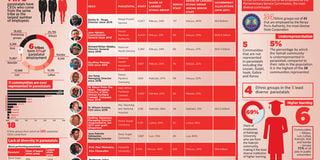Breaking News: At least 10 feared to have drowned in Makueni river
Kikuyu, Kalenjin majority in government offices

What you need to know:
- The Kikuyus comprise the largest number of employees in parastatals at 25 per cent followed by Kalenjins at 17 per cent.
- The National Cohesion and Integration Act prohibits any public establishment from having more than one third of its staff from the same ethnic community.
- The distribution of public jobs, especially those at the political appointment level, has been a major issue in the Jubilee government.
A majority of employees in government ministries come from the Kikuyu and Kalenjin communities, an audit report has shown.
According to the report compiled by a team led by Auditor- General Edward Ouko on the socio-economic audit of the new constitution, the two communities represent 42 per cent of employees in the parastatals audited by the National Cohesion and Integration Commission (NCIC).
The Kikuyus comprise the largest number of employees in parastatals at 25 per cent followed by Kalenjins at 17 per cent.
“The representation of these major communities is higher than their population ratio of 17 per cent and 13 per cent, based on the 2009 Kenya National Population and Housing Census,” says the report.
Luhya, Luo and Kamba were ranked third, fourth and fifth respectively with 14, 12 and 9 per cent. The five least represented communities include Basuba at 0.01 per cent, Taveta (0.04), Nubi (0.05), Mbeere (0.12) and Gabra at 0.13 per cent.
The report, commissioned between August 2014 and September 2016, says that provisions on promoting an inclusive society require that all appointments and recruitments to public offices to reflect regional and ethnic diversity of the people of Kenya.
“Article 130(2) requires the national Executive to reflect diversity, while Article 132 requires the President to promote respect for the diversity of the people and communities of Kenya,” says the report.
“The Constitution also requires the government’s recruitment policy to promote ethnic balance as per the aspirations of the Constitution, specifically Article 232 on Values and Principles of Public Service,”
The National Cohesion and Integration (NCIC) Act also prohibits any public establishment from having more than one third of its staff from the same ethnic community.
The two communities (Kikuyus and Kalenjins) according to the data produced by the Ouko team report dominate the Ministries, Departments, Agencies and the Civil Service with some ethnic communities including Galla, Konso, Galjeel and Leysan unrepresented.
“The Kalenjins and Kikuyus have relatively higher share of civil service jobs than their proportionate share of the population.
They also have relatively more people in the civil service than other groups. Others with more share of jobs than their size of population include the Kisii, Meru, and Embu,”
Groups such as the Luhya, Luo, Miji Kenda, Maasai and the Turkana have relatively less share of civil service jobs than their proportionate share of population. The Kamba and many numerically small communities have proportions that are equal to their share of the population.
The distribution of public jobs, especially those at the political appointment level, has been a major issue in the Jubilee government.
There have been complaints that most beneficiaries have been from the Kikuyu and Kalenjin communities whose sons, Uhuru Kenyatta and William Ruto are President and Deputy President respectively.


